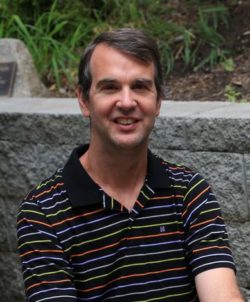

Washington State University Vancouver
14204 NE Salmon Creek Avenue
Vancouver, WA 98686-9600
dslavit@wsu.edu
(011) 360-546-9653 – office
(011) 360-546-9040 – fax
Directory Page
David Slavit, Ph.D.
Professor of Mathematics Education/Mathematics
Coordinator, WSU Mathematics and Science Education PhD
Coordinator, WSU Middle Level Mathematics Endorsement
Coordinator, WSUV Masters in Teaching Elementary Certification Program
Greetings. My name is David Slavit, Professor in both the Department of Teaching & Learning and the Department of Mathematics at Washington State University Vancouver. Born and raised in Crystal City, Missouri, I am the son of a glassworker and the youngest of eight children. Fortunately, my career path has supported my desires to travel as well as investigate how we, as humans, think, interact, and learn.
After receiving my B.S.ed. in Mathematics Education and M.A. in Mathematics from the University of Missouri, I began teaching at Lyon College, formerly known as Arkansas College. Upon receiving a sabbatical, I enrolled at the University of Delaware, home of the Fightin’ Blue Hens, and obtained my Ph.D. in Mathematics Education under Jim Hiebert.
Research
Through numerous federally-funded grants and the initiation of school-university partnerships, I have been able to investigate research problems in three main areas:
- Investigating the start-up and instructional dimensions of STEM-focused schools. This includes the transitioning of vision to educational reality, and the project-based learning and standards-based grading aspects of the student learning experience.
- Analyzing teacher development at the classroom, building, and district levels. My perspective stems from the belief that teaching involves more than the employment of professional knowledge constructed, formalized, and conveyed by experts (Cochran-Smith & Lytle, 2009). Sharing Judith Warren Little’s (2003) “optimistic premise of professional community”, my work seeks to go beyond investigations into the acquisition of new knowledge and understand teacher change as a complex process that requires an interactive, communal environment that supports reflection, discourse, and data-based inquiry (Jaworski, 2008; Kazemi & Franke, 2004; McLaughlin & Talbert, 2006).
- Researching student learning, particularly in regard to students’ development of algebraic reasoning out of arithmetic thought processes.
I have also investigated the effects of technology on teaching and learning at the secondary and postsecondary levels, with a particular emphasis on graphing calculators and web-based activities.
Mathematics and Science Education PhD Program at Washington State University
As founding director of the WSU Mathematics and Science Education PhD, I have been able to see our community develop from a very small group in 2012 to approximately 20 students and 10 faculty. The program has also afforded several additional research opportunities for both myself and the doctoral students with whom I have collaborated.
For information on the program, and to see a list of doctoral student work, please visit the program website at https://education.wsu.edu/graduate/mathematicsandscienceed/